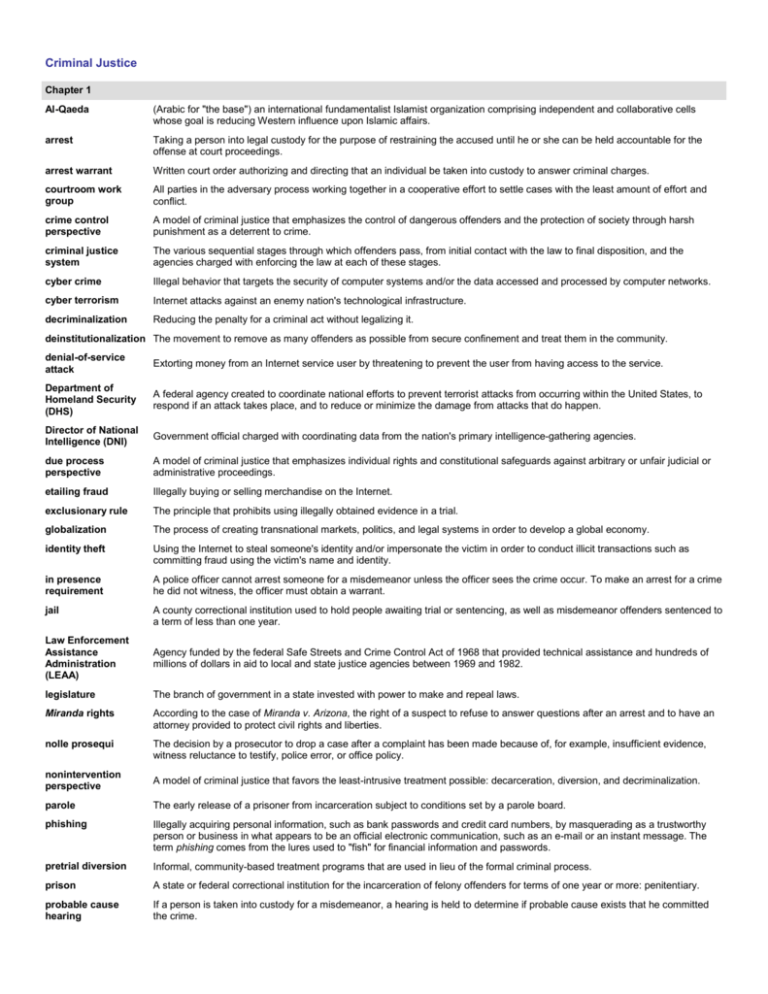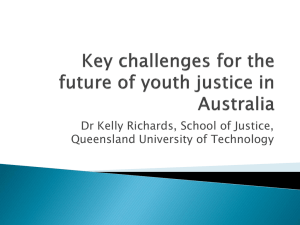File
advertisement

Criminal Justice Chapter 1 Al-Qaeda (Arabic for "the base") an international fundamentalist Islamist organization comprising independent and collaborative cells whose goal is reducing Western influence upon Islamic affairs. arrest Taking a person into legal custody for the purpose of restraining the accused until he or she can be held accountable for the offense at court proceedings. arrest warrant Written court order authorizing and directing that an individual be taken into custody to answer criminal charges. courtroom work group All parties in the adversary process working together in a cooperative effort to settle cases with the least amount of effort and conflict. crime control perspective A model of criminal justice that emphasizes the control of dangerous offenders and the protection of society through harsh punishment as a deterrent to crime. criminal justice system The various sequential stages through which offenders pass, from initial contact with the law to final disposition, and the agencies charged with enforcing the law at each of these stages. cyber crime Illegal behavior that targets the security of computer systems and/or the data accessed and processed by computer networks. cyber terrorism Internet attacks against an enemy nation's technological infrastructure. decriminalization Reducing the penalty for a criminal act without legalizing it. deinstitutionalization The movement to remove as many offenders as possible from secure confinement and treat them in the community. denial-of-service attack Extorting money from an Internet service user by threatening to prevent the user from having access to the service. Department of Homeland Security (DHS) A federal agency created to coordinate national efforts to prevent terrorist attacks from occurring within the United States, to respond if an attack takes place, and to reduce or minimize the damage from attacks that do happen. Director of National Intelligence (DNI) Government official charged with coordinating data from the nation's primary intelligence-gathering agencies. due process perspective A model of criminal justice that emphasizes individual rights and constitutional safeguards against arbitrary or unfair judicial or administrative proceedings. etailing fraud Illegally buying or selling merchandise on the Internet. exclusionary rule The principle that prohibits using illegally obtained evidence in a trial. globalization The process of creating transnational markets, politics, and legal systems in order to develop a global economy. identity theft Using the Internet to steal someone's identity and/or impersonate the victim in order to conduct illicit transactions such as committing fraud using the victim's name and identity. in presence requirement A police officer cannot arrest someone for a misdemeanor unless the officer sees the crime occur. To make an arrest for a crime he did not witness, the officer must obtain a warrant. jail A county correctional institution used to hold people awaiting trial or sentencing, as well as misdemeanor offenders sentenced to a term of less than one year. Law Enforcement Assistance Administration (LEAA) Agency funded by the federal Safe Streets and Crime Control Act of 1968 that provided technical assistance and hundreds of millions of dollars in aid to local and state justice agencies between 1969 and 1982. legislature The branch of government in a state invested with power to make and repeal laws. Miranda rights According to the case of Miranda v. Arizona, the right of a suspect to refuse to answer questions after an arrest and to have an attorney provided to protect civil rights and liberties. nolle prosequi The decision by a prosecutor to drop a case after a complaint has been made because of, for example, insufficient evidence, witness reluctance to testify, police error, or office policy. nonintervention perspective A model of criminal justice that favors the least-intrusive treatment possible: decarceration, diversion, and decriminalization. parole The early release of a prisoner from incarceration subject to conditions set by a parole board. phishing Illegally acquiring personal information, such as bank passwords and credit card numbers, by masquerading as a trustworthy person or business in what appears to be an official electronic communication, such as an e-mail or an instant message. The term phishing comes from the lures used to "fish" for financial information and passwords. pretrial diversion Informal, community-based treatment programs that are used in lieu of the formal criminal process. prison A state or federal correctional institution for the incarceration of felony offenders for terms of one year or more: penitentiary. probable cause hearing If a person is taken into custody for a misdemeanor, a hearing is held to determine if probable cause exists that he committed the crime. probation A sentence entailing the conditional release of a convicted offender into the community under the supervision of the court (in the form of a probation officer), subject to certain conditions for a specified time. profile (profiling) The practice of police targeting members of particular racial or ethnic groups for traffic and other stops because they believe that members of that group are more likely to be engaged in criminal activity even though the individual being stopped has not engaged in any improper behavior. rehabilitation perspective A model of criminal justice that sees crime as an expression of frustration and anger created by social inequality that can be controlled by giving people the means to improve their lifestyle through conventional endeavors. restorative justice A perspective on justice that views the main goal of the criminal justice system to be a systematic response to wrongdoing that emphasizes healing the wounds of victims, offenders, and communities caused or revealed by crime. It stresses noncoercive and healing approaches whenever possible. slave patrols Vigilante groups that enforced discipline on slaves and apprehended runaway slaves seeking freedom. social control The ability of society and its institutions to control, manage, restrain, or direct human behavior. terrorism Premeditated, politically motivated violence perpetrated against noncombatant targets by subnational groups or clandestine agents. victimless crime A crime typically involving behavior considered immoral or in violation of public decency that has no specific victim, such as public drunkenness, vagrancy, or public nudity. warez The efforts of organized groups to download and sell copyrighted software in violation of its license. "wedding cake" model of justice A view of justice that divides the criminal process into four layers based on the seriousness and notoriety of the crime. The top layer gets the full interest of the law, whereas the bottom layer receives only superficial attention. widening the net To enmesh more offenders for longer periods in the criminal justice system—a criticism of pretrial diversion programs.








